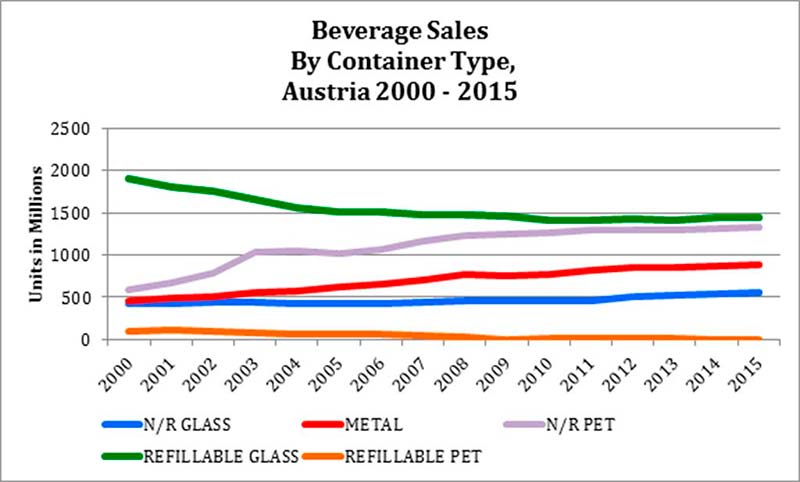Austria has two laws dealing with beverage container deposits: the 1990 Order puts a deposit on refillable plastic bottles, while the 2021 Amendment puts a deposit on single-use containers. Each piece of legislation has its own labeled table; see below for the two separate laws.
2021 Government Decision on Single-Use Deposit Return System
| Law Summary |
2021 Government Decision regulating the deposit-return system for primary non-refillable packaging (RGR) [1] |
| Date Implemented | 1/1/2025 |
| Beverages Covered |
Beverages in PET and aluminum containers between 0.1L and 3L, including: [2]
|
| Beverages Not Covered |
|
| Amount of Deposit |
EUR 0.25 [3] |
| Reclamation System | Return to retail (Manual and RVMs) |
| Handling Fee |
Manual collection fee:
RVM collection fee:
|
| Other Fees |
TBD |
| Program Success | N/A |
Details
In July 2020, the Austrian Environment Ministry announced a deposit-return system on single use containers (plastic and metal) along with refillable containers. This was part of a greater 3-point plan which includes implementing legally-binding quotas for the market share percentage of refillable containers. Plastic producers would also bear the cost of the newly introduced EU plastic tax.
The Austrian Council of Ministers passed a Government Decision to amend the Waste Management to implement a single-use container DRS in October 2021. [6] The Government Decision also establishes a market share quota for the percentage of beverages in refillable containers offered to consumers: refillables must comprise 25% of the market share by 2025, and 30% by 2030. Non-alcoholic beverages in containers less than 0.5L are exempted from the refillable quotas. These containers may be subject to the refillables deposit, described in the section below.
The Amendment must pass through Parliament to be implemented and began implementation on January 1, 2025. Return collection goals were also established: the system administrator, Recycling Pfand Österreich, has a goal of 80% collection by the end of 2025 and 90% by the end of 2027. [7] Recycling Pfand Österreich, in addition to handling the operations and administration of the deposit system, collect all deposit material returned through the system. They then sell the material back to producers for new container manufacturing. [8]
Single-use containers may be returned at the same RVMs as refillable containers. Retailers may only accept through manual collection the type of containers they sell (ex. if they only sell aluminum cans, they do not need to accept PET bottles), and may choose to accept the "quantities sold in each purchase" by that retailer. [9]
According to a 2024 study commissioned by TOMRA Collection Austria, many people feel positively about the expanded DRS, with 82% of respondents in favor. [10]
On January 1, 2025. Austria implemented this deposit system for PET and aluminum containers. In April 2025, the managing director of Recycling Pfand Österreich noted that the launch was smooth, and that approximately 26 million containers were returned within the first 3 months of implementation. There are currently around 6,000 automated RVMs and around 8,000 manual return locations. [11]
1990 ORDER CONCERNING REFILLABLE PLASTIC BOTTLES
| Name | Ordinance on Taking Back and Deposit Payments for Refillable Plastic Beverage Containers (Federal Law Gazette No 513/1990 as amended by Federal Law Gazette II No 440/2001) [12] |
| Law Summary | Requires deposits on refillable PET bottles. (Non-refillable plastic containers are exempt.) |
| Date Implemented | 7/1/1990; Amended in 2001 and implemented again in 2002. |
| Containers Covered | Refillable PET bottles. |
| Amount of Deposit |
EUR 0.40 deposit per PET container. |
| Fees and Taxes | Voluntary recycling fee of U.S. $0.02 - $0.08 on one-way containers |
| Program Success | N/A |
Details
In the 1990s, the Austrian government introduced various ordinances regarding waste management and container recycling. This included the establishment of recycling targets for containers (to be reached by 2000), and the implementation of a voluntary deposit scheme ordinance for refillable plastic containers. [13] Though successful at the time, the number of beverages sold in refillable containers has decreased in the last two decades, in tandem with a rise in beverages sold in non-refillable containers.
The establishment of a beverage market sale quote on refillables is expected to help counteract this, with Environment Minister Leonore Gevesler stating, "By returning bottles for multiple use, customers get a choice. It will be not only for beer, but also juices, sour water, but also milk." [14]
Source: Reloop Platform's "Beverage sales by container type in Austria." 2015.
Sources
[1] "PRESS RELEASE: Government approved today the GD regulating the deposit-return system." Austrian Directorate for Communication, Transparency, and IT. October 5, 2021.
[2] "The single-use deposit system." EWP Recycling Pfand Österreich gGmbH. Last accessed January 31, 2024.
[3] Ibid.
[4] "Handling fee information." EWP Recycling Pfand Österreich gGmbH. Last accessed January 31, 2024.
[5] "Austria plans deposit for single-use beverage containers, quota for refillable bottles." Europäischer Wirtschaftsdienst GmbH, July 9, 2020.
[6] "Österreich bekommt ab 2025 ein Plastikpfand, Höhe noch nicht fixiert." (trans. "Austria will receive a Plastic Deposit in 2025, amount not yet decided." STANDARD Verlagsgesellschaft m.b.H. October 13, 2021.
[7] See Footnote 2.
[8] "FAQ." EWP Recycling Pfand Österreich gGmbH. Last accessed January 31, 2024.
[9] Ibid.
[10] "Austria launches new deposit return scheme for recycling single-use drink containers." TOMRA. January 1, 2025.
[11] "Austria's Transition to One-Way Deposit System Begins Smoothly." The Germany Eye. April 2, 2025.
[12] "National factsheet on separate collection: Austria." Copenhagen Resource Institute. September 2015.
[13] "Plastic Pollution Lobby: A coalition against the introduction of a deposit return system in Austria." Changing Markets Foundation, Break Free From Plastic Movement. May 2020.
[14] See Footnote 3.
Last updated on April 2, 2025.
